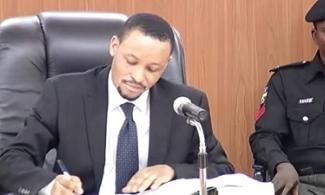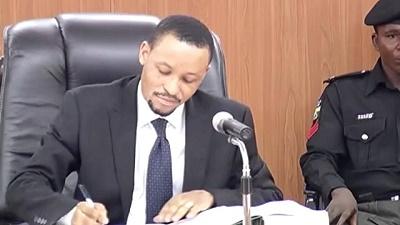
In the petition signed by Grace Wogor, the group wants Umar sanctioned for issuing the directive for Onnoghen's suspension, noting that it is an abuse of court process as the suspended CJN had not been convicted.

Danladi Umar, Chairman of the Code of Conduct Tribunal (CCT), says he is not answerable to any institution but the presidency.
He stated this in response to a petition filed by a group, the Incorporated Trustees of the Centre for Justice and Peace Initiative, accusing him of abusing court process and urging the National Judicial Council to impose sanctions on him.
Umar is heading the Tribunal before whom Walter Onnoghen, the suspended Chief Justice of Nigeria (CJN), is standing trial over allegations of fraudulent declaration of assets.
President Muhammadu Buhari had suspended Onnoghen based on a directive by the Umar-led CCT.
However, Umar insists he is not under the authority of any judicial institution, but the presidency.
In the petition signed by Grace Wogor, the group wants Umar sanctioned for issuing the directive for Onnoghen's suspension, noting that it is an abuse of court process as the suspended CJN had not been convicted.
According to The Punch newspaper, the Federal Judicial Service Commission (FJSC) had issued a query to the CCT Chairman to respond to the petition.
Responding to the query via a document marked CCT/HQ/FJSC/S/01 and dated, February 6, 2019, which was addressed to the acting Chairman of the FJSC, Umar said himself and other members of the Tribunal are "not judicial officers" and as such were not subject to judicial institutions such as the FSJC and the NJC.
He said: “With regard to the prayer of the petitioner for an appropriate sanction against the chairman, it is important to note that the chairman and members of the tribunal, not being judicial officers, are not constitutionally subject to any disciplinary proceedings by either the National Judicial Council or the Federal Judicial Service Commission but the Presidency.
“The petitioner alleged that judicial oaths were breached and that the National Judicial Council should consider appropriate sanctions. It is to be noted that the chairman and members of the Code of Conduct Tribunal are not judicial officers.
“This is predicated on the fact that the chairman and members of the tribunal, during swearing-in, only subscribe to official oaths and not judicial oaths. Therefore, not being a judicial officer, I did not subscribe to judicial oaths as alleged.”
On the decision of the CCT to grant the suspension order, he said it was within his power to do so, but refused to comment further as the matter was still in court.
A letter dated May 18, 2015, and marked NJC/CIR/HOC/1/74, was also attached to Umar's response, signed by Justice Mahmud Mohammed, who was the CJN at the time.
According to the letter, Mohammed had asked the CCT to stop referring to themselves as justices as they were not judges.
The decision was made pursuant to Paragraph 15 (1 and 2) of Part 1 of the Fifth Schedule of the 1999 Constitution of the Federal Republic of Nigeria.
“From the foregoing provisions, no member, including the chairman of the CCT on appointment, is a judicial officer as defined in Section 318 (1) of the 1999 Constitution as amended unless he or she has held office as a judge of the superior court of record in Nigeria," the letter read.